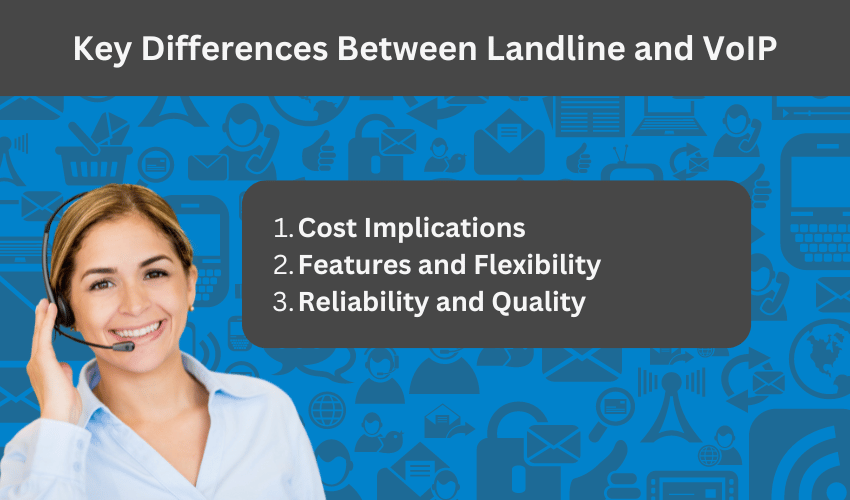Landline vs VoIP: Which is Best for Your Small Business in 2024?
Phone Service USA - VoIP - Landline vs VoIP: Which is Best for Your Small Business in 2024?
In today’s rapidly evolving business landscape, the decision between landline and VoIP is not just a choice, but a crucial responsibility for small businesses seeking efficient communication solutions. While traditional landlines have long been the backbone of business communications, Voice over Internet Protocol (VoIP) offers a modern alternative that combines flexibility, scalability, and cost-effectiveness. This decision can significantly influence not only day-to-day operations but also a company’s strategic direction, empowering you, as a small business owner, to shape the future of your business communications with confidence.
As we enter the year 2024, it’s crucial for small businesses to assess which system — landline or VoIP — best suits their needs. This article delves into the key differences, costs, features, and reliability of each option, equipping you with the necessary knowledge to make an informed decision. Whether you’re establishing a new office or considering an upgrade to your communication systems, understanding these options will strengthen your business communications and prepare you for the future.
Also Read:
Table of Contents

Understanding the Basics
To make a well-informed decision about whether to invest in a landline or VoIP for your small business, it’s essential to grasp the fundamentals of each technology and its differences. This understanding will not only make you feel informed but also confident in your decision-making process, knowing that you are armed with the necessary knowledge to select the best communication solution for your business.
What is a Landline?
A landline, a traditional telephone line, operates through a physical wire network, typically copper, that transmits analog voice data. This technology has been the foundation of telecommunication for over a century, offering a simple and direct method of voice communication. Landlines are known for their reliability and clear voice quality, mainly because they do not depend on internet connectivity. They operate independently of a business’s internet service and remain functional even during power outages, provided the phone does not require external power.
What is VoIP?
Voice over Internet Protocol (VoIP) is a recent technology that converts voice into digital packets and transmits it over the Internet. This method allows for voice, and often video, communications to be made through personal computers, VoIP phones, or even traditional phones connected via special adapters. Unlike landlines, VoIP can integrate with a wide array of modern communication features like voicemails that can be sent to email, call forwarding, virtual numbers, and much more. The flexibility and scalability of VoIP make it a particularly attractive option for businesses that need more than just voice communication solutions, reassuring you that your communication needs will be met not just now, but also in the future.
Both systems serve the same fundamental purpose—voice communication—but they do so through very different mechanisms that have distinct implications for business use. Understanding these can help you better assess which system aligns with your business requirements.

Key Differences Between Landline and VoIP
When choosing between landline and VoIP for your small business, several vital factors differentiate these two options, each impacting your decision based on your business needs.
Cost Implications
Landline Costs:
- Initial Setup and Installation: Setting up a landline can involve substantial initial costs, including installation fees for each line and the necessary hardware.
- Monthly Charges: Regular monthly fees for landline services are typically fixed, and they include charges for local, national, and international calls, which can add up quickly.
- Maintenance: Landlines require physical hardware and infrastructure maintenance, which can also incur costs, especially as the system ages.
VoIP Costs:
- Lower Initial Costs: VoIP systems generally have lower setup costs since they primarily require internet access and VoIP-compatible hardware.
- Scalable Expenses: Monthly fees for VoIP services often vary based on usage rather than a fixed rate, and many providers offer packages that include free calls to specific regions or between the same provider’s networks.
- Minimal Physical Infrastructure: Since VoIP runs over the internet, the maintenance costs associated with physical lines are significantly reduced.
Features and Flexibility
Landline Features:
- Essential Functions: Traditional features include call waiting, caller ID, and voicemail, which are generally sufficient for crucial business operations.
- Limited Flexibility: Landlines offer limited flexibility in integrating other digital tools or software, which can be a drawback for businesses that rely heavily on technology integration.
VoIP Features:
- Advanced Features: VoIP services typically include advanced functionalities like call forwarding, automatic call recording, video conferencing, and integration with CRM systems.
- High Flexibility: VoIP systems can be easily adjusted or expanded based on business growth or changing needs, offering high scalability without significant additional costs.
Reliability and Quality
Landline Reliability:
- High Dependability: Landlines are known for their reliability and do not depend on internet connectivity, ensuring consistent service even during network outages.
- Consistent Quality: The voice quality on landlines is consistently clear, with minimal latency or distortion.
VoIP Reliability:
- Dependent on the Internet: VoIP’s reliability depends on internet quality and speed. Poor internet service can lead to dropped calls and low-quality audio.
- Variable Quality: VoIP can offer high-definition voice quality but may also suffer from issues like jitter and latency if not correctly configured or if the internet connection is unstable.
The decision between landline and VoIP involves weighing these differences against your business’s operational needs, budget constraints, and future growth plans. Each option offers distinct advantages and potential drawbacks, making it crucial to evaluate them carefully. The weight of this decision is significant, as it can shape the future of your business communications.

Advantages and Disadvantages
Choosing the right communication system is crucial for your business. Understanding the advantages and disadvantages of landlines and VoIP can help you make an informed decision.
Advantages of Using a Landline
Stability and Clarity:
- Reliability: Landlines are less likely to be affected by local internet issues and do not depend on electricity, so they work even during power outages.
- Voice Quality: Landlines generally provide superior voice clarity and fewer interruptions during calls, which is crucial for professional interactions.
Simplicity and Security:
- Ease of Use: Landlines are straightforward with fewer features, which can be an advantage for users who prefer simplicity.
- Security: Since landlines transmit voice through physical lines, they are less susceptible to cyber threats than internet-based communications.
Disadvantages of Using a Landline
Cost and Infrastructure:
- Higher Ongoing Costs: The cost of maintaining and expanding landline infrastructure can be high, especially for growing businesses.
- Physical Limitations: Landlines require physical installation, which can be restrictive and inflexible, particularly for businesses that need scalable and mobile solutions.
Technological Limitations:
- Lack of Advanced Features: Traditional landlines need more advanced functionalities that modern businesses might need, such as integration with digital tools and mobile applications.
Advantages of Using VoIP
Cost Efficiency and Scalability:
- Reduced Costs: VoIP systems are generally more cost-effective, offering lower setup, call, and maintenance costs.
- Scalability: Easily scalable, VoIP can grow with your business without additional expense or infrastructure.
Advanced Features and Flexibility:
- Rich Feature Set: VoIP services include features like auto-attendant, call queues, conference calling, and seamless integration with other business platforms.
- Remote Capabilities: VoIP allows employees to connect from anywhere via the Internet, supporting remote work arrangements and flexible working environments.
Disadvantages of Using VoIP
Dependency on the Internet:
- Connectivity Issues: VoIP quality and reliability heavily depend on internet connection stability and bandwidth.
- Power Dependency: Unlike landlines, VoIP systems require power and internet service, which can be problematic during outages unless backed up by uninterruptible power supplies.
Security Concerns:
- Vulnerability to Cyber Attacks: VoIP is an internet-based technology That is more susceptible to cyber threats, necessitating robust security measures and regular updates.
Understanding these pros and cons provides a clearer picture of what each type of system can offer and what limitations they might impose on your business operations. Discover more about how VoIP can transform your business operations in our article on the Benefits of VoIP for Businesses.

Making the Right Choice for Your Business
Deciding whether to choose a landline or VoIP system for your small business involves weighing the pros and cons we’ve discussed against your business’s specific needs and circumstances. Here’s how to approach this critical decision:
Factors to Consider
- Business Size and Scale: Consider your business’s size and growth plans. VoIP systems are generally better suited for businesses that expect to scale quickly or have fluctuating needs.
- Communication Needs: Evaluate the types of communication your business requires. VoIP might be better if your company relies heavily on international calls or requires advanced features like video conferencing.
- Budget Constraints: Assess your budget not just for the immediate costs but also for long-term expenditures. VoIP typically offers a lower overall cost due to reduced installation, call, and maintenance fees.
- Technical Infrastructure: Consider the existing infrastructure in your business. If you’re moving to a new office that lacks sufficient internet bandwidth, upgrading might be necessary before considering VoIP.
Transitioning to VoIP
If, after evaluating these factors, you decide that VoIP is the right choice for your business, planning a smooth transition is crucial. Here’s what to consider:
- Vendor Selection: Choose a reputable VoIP provider with the features, reliability, and customer support you need. Look for providers with positive reviews and service level agreements suitable for your business needs.
- Employee Training: Prepare your staff for the switch to VoIP with training sessions that cover how to use the new system effectively. This will help minimize disruption and maximize the benefits of your new communication tools.
- Pilot Testing: Consider running a pilot test with a small group of employees or a single department before rolling out the system across your entire organization. This approach allows you to address any issues on a smaller scale.
Making the correct choice involves a thorough understanding of your business’s current and future needs and a strategic approach to implementation that ensures minimal disruption and maximum benefit. Learn more about setting up VoIP in our comprehensive VoIP Setup Guide.
Conclusion
Choosing between a landline and VoIP system for your small business is more than just an operational decision; it’s a strategic one that can significantly influence how your company communicates internally and with the world. As we’ve explored, each system offers its benefits and drawbacks. Landlines provide unmatched reliability and simplicity, making them ideal for businesses with basic communication needs or areas with unreliable internet. On the other hand, VoIP offers unparalleled flexibility, cost efficiency, and advanced features for dynamic and growing businesses.
Before making a decision, consider the specific needs of your business, including your budget, scalability requirements, and the importance of mobility and advanced features in your daily operations. It’s also crucial to consider the potential for future growth and how each system can accommodate this growth.
Ultimately, the right choice will depend on carefully assessing your current and anticipated needs. Whether you continue with a traditional landline or transition to a VoIP system, ensure that your choice aligns with your long-term business goals and will support your operations’ evolving demands. Making an informed decision now will set the foundation for robust and effective business communications, positioning your company for success in an increasingly connected world.
VOIP Phone Services for Small Businesses

What is Call Center Compliance? Why It Matters in 2024
Ensure your call center operations meet stringent laws and standards with our expert insights on call center compliance. Stay compliant and avoid costly penalties.

5 Powerful Customer Retention Strategies
Improve customer retention by showing appreciation. Reward loyalty and keep customers coming back with proven strategies that strengthen relationships.

The Evolution of VoIP Technology and Equipment: Transforming Telecommunications
VoIP technology is revolutionizing the telecom industry. Learn about its transformative journey and how it benefits your communication needs!

